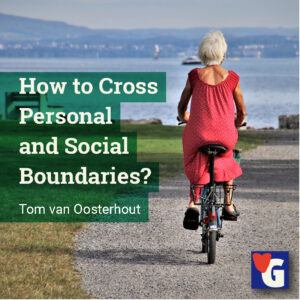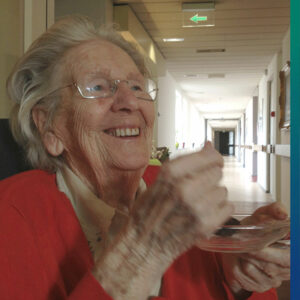
Why does a woman of 90 say: “I am not old. My neighbour is old.” And how old is your neighbour? “91.” With her statement, the 90-year-old woman emphasizes her independence. She warns you not to cross her personal boundaries. To cross personal and social boundaries is an effort.
The fear of crossing personal and social boundaries is a common human quality. Most people don’t want to ask others for help. The fear of losing independence is the biggest psychological threshold. On the other hand, nearly everybody is willing and prepared to help others.
To get something done we will have to cross our personal and social boundaries. Many personal issues we address with AGEwithCARE tackle this challenge.* Yet there is a limit in how much care you can take of yourself. Our personal time, space, and behaviour just have their boundaries. How do we cross these boundaries?
Some of the links might be affiliate links. As an affiliate associate, we earn a small commission when you purchase any of the products offered through the shared links at no extra cost for you. This helps us to maintain this website.
Table of contents
Paying taxes

Despite the psychological thresholds, most people are aware that personal boundaries can only be crossed with the assistance of others. From the pumpkin seeds in your garden to the computer on which you read this blog, you know that someone made the effort for you to enjoy these.
As we all know that paying taxes enables the government to develop public services, such as security, which we all enjoy. Humans through the centuries have developed very sophisticated systems to manage the enormous amount and diversity of concerns we share.
Single-issues
However, the government’s efforts are limited as well. It’s impossible and highly undesirable for lawmakers to enter into people’s personal spaces and concerns.
Moreover, the government often has to balance between contrary concerns of the people and the common good, such as the environment and the climate. The government also has to guard the concerns of minorities against the intrusions of the majority.
But governments would be totally impotent without the input of the people. This is where single-issue initiatives step in. Such as human rights, environmental and climate movements. Although these movements are still relatively small compared to the international labour movement, and worldwide amateur sports organizations. These are highly competent and very influential movements with strong ties to many governments.
Ageing
Voluntary elderly associations blossom in many countries. Although they appear to be single-issue associations that support the concerns of the elderly, usually they also serve public and personal concerns. They’re a source of information for authorities and often provide personal care and consultancy.
However, research shows that the bigger these associations, the less voice personal concerns have in them. Most voluntary associations that look after the concerns of the elderly have not yet developed mechanisms for participants to express their voices.
Of course, it’s obvious that governments are hardly proper examples. They usually lack these mechanisms as well. Yet with the coming of age of the highly educated generations, the sheer existence of these associations will depend upon the proper use of, among others, modern social media.
Local communities

The large elderly associations mostly invest in national, and sometimes regional, concerns. Such as the effects of tax systems for the elderly and subsidies for mobility. In many cities, you will find local elderly associations. These are usually only concerned with personal care. These associations are very important.
However, it’s striking that elderly people also run many other local associations. Although these have different concerns such as culture and the neighbourhood. The overrepresentation of the elderly in these associations is usually explained with a reference to their available time and experience.
Related: The Importance of Life Expectancy for your Unique Personal Situation
Voluntary associations

Most of the knowledge that’s involved in running voluntary associations is buried deep within the history of these associations and the memories of the participants. Only now and again some insights are collected, examined and the results shared.
Voluntary associations exist because the people who participate manage their mutual concerns. The biggest challenge the participants face is the management of their social relations. No matter how qualified you are in solving practical problems, to mutually honouring and respecting each other is an often overwhelming job.
Most practical problems often appear insignificant if it comes to the management of the social relations involved. But as a matter of fact, they are both of interest and extremely intertwined.
This makes the management of voluntary associations one of the biggest social challenges. There are no laws or other instruments to cross personal and social boundaries. This is why these associations are called voluntary. The participants have to cross these boundaries all by themselves. Fortunately for this, there are some rules of thumb.
Related: Why Giving is our most Fundamental Human Motive

The best way to honour and respect the challenges that are evoked by personal and social boundaries are:
- Invest in mechanisms through which people can express their concerns and opinions.
- Use these mechanisms to establish shared goals and a plan on how you want to achieve these.
- Show that you care: listen to what others have to say and respond, even if you disagree.
- See to it that different concerns and opinions can exist alongside each other.
- Motivate people to participate actively by mutual support and appreciation.
- Nobody is perfect, but everybody is able to contribute.
- Always honor people’s efforts.
Be aware that crossing personal and social boundaries is a gift we all possess. Nevertheless, now and again you can use some help. So the first step you can take if you want to cross your personal and social boundaries, ask us for a personal interview.

Our free products are:
- Finance: Have a healthy money mindset
- Happiness: 20 Tips to improve your life
- Exercise: How to build your exercise routine
- Culture: Prepare yourself for a museum visit
- Exercise and fall prevention: 56 Ways to improve your mobility
Moreover, if you struggle with questions about health, exercise, food, weight and mobility, please ask them in the comment box below.

